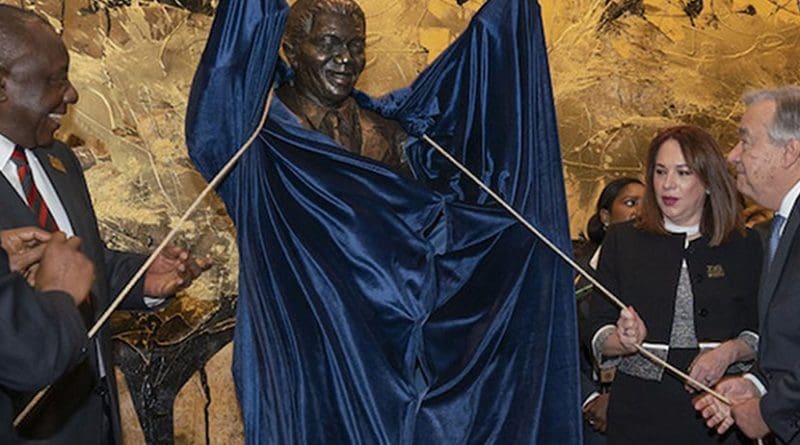Nelson Mandela Peace Summit Rebukes ‘America First’ Strategy – OpEd
By IDN
By Lisa Vives
South African President Cyril Ramaphosa couldn’t be prouder as he unveiled a life-size statue of Nelson Mandela on September 24, a day before the start of the General Debate of the 73rd session of the UN General Assembly (UNGA73) and the opening of a day-long historic ‘Nelson Mandela Peace Summit’, a high-level plenary meeting convened by the President of the General Assembly, María Fernanda Espinosa.
The focus of the Peace Summit was on Global Peace in honour of the centenary of the birth of Nelson Mandela, a South African anti-apartheid revolutionary and political leader, who served as President of South Africa from 1994 to 1999. He was the country’s first black head of state and the first elected in a fully representative democratic election.
The statue is a gift to the United Nations from South Africa. Mandela’s arms are outstretched, as if to embrace people everywhere.
“The people of our country, united in their diversity, revere Nelson Mandela as the founding father of our democratic nation,” President Ramaphosa said to a gathering of UN delegates, “whose life, sacrifices and extraordinary contribution to freedom continues to inspire successive generations.”
The Nelson Mandela Peace Summit urged world leaders to “redouble efforts to pursue international peace and security, development and human rights”, and declared years 2019-2028 the ‘Nelson Mandela Decade of Peace.’
The General Assembly honoured ‘Madiba’ (Southern African title of respect for Nelson Mandela, deriving from his Xhosa clan name) with a pledge to build a just, peaceful and prosperous world and to revive the values for which the former South African President and anti-apartheid campaigner stood.
Member States adopted the first resolution of the UNGA73, “committing to demonstrate mutual respect, tolerance, understanding and reconciliation in [their] relations.”
“We resolve to move beyond words in the promotion of peaceful, just, inclusive and non-discriminatory societies, stressing the importance of the equal participation and full involvement of women and the meaningful participation of youth in all efforts for the maintenance and promotion of peace and security,” read the resolution.
UN Secretary-General António Guterres acknowledged the world is far from achieving Mandela’s ideals which also include human rights and global cooperation.
“Today, with human rights under growing pressure around the world, we would be well served by reflecting on the example of this outstanding man,” Guterres said referring to Madiba. “We need to face the forces that threaten us with the wisdom, courage and fortitude that Nelson Mandela embodied.”
This year also marks President Ramaphosa’s inaugural participation in the General Assembly as head of state where he will outline South Africa’s domestic and foreign policy goals including the long-awaited land reform program.
The original plan, including expropriation without compensation, appears to be headed for an uphill battle with some economists saying this would violate the Constitution.
Shortly after the statue unveiling, President Donald Trump arrived in the building and made a brief appearance at a separate event on fighting the global scourge of illegal drugs.
According to the IRIN news agency, heads of delegations were told to sign a non-negotiable text to appear at the photo-op with Trump. At least 124 agreed, but several high-profile holdouts refused, and the EU has drawn up its own dueling letter.

